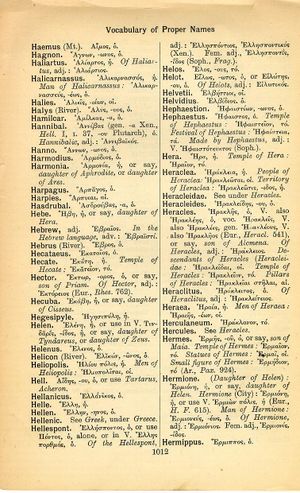Herculaneum
Εἰ μὲν ἐπ' ἀμφοτέροισιν, Ἔρως, ἴσα τόξα τιταίνεις, εἶ θεός (Rufinus, Greek Anthology 5.97) → If, Eros, you're stretching your bow at both equally, then you're a god.
English > Greek (Woodhouse)
Ἡράκλανον, τό.
Latin > English (Lewis & Short)
Hercŭlānĕum: (Hercŭlānĭum, Plin. 3, 5, 9, § 62; but the modern form Herculanum is not Lat.; in Cic. Att. 7, 3, 1, read Aeculanum; v. Orell. ad loc.), ĕi, n., = Ἡράκλειον,
I a town of Campania, situated on the sea-coast, between Naples and Pompeii, and buried along with the latter city by an eruption of Vesuvius, A. D. 79, Mel. 2, 4, 9; Plin. 3, 5, 9, § 62; Sisenn. ap. Non. 207, 9; Liv. 10, 45; Vell. 2, 16, 2; Sen. Q. N. 6, 26 fin.; Flor. 1, 16.—
II Derivv.
A Her-cŭlānĕus (-lanus), a, um, adj., of or belonging to Herculaneum, Herculanean: via, Cic. Agr. 2, 14, 36; Plin. 15, 18, 18, § 72; Cloat. ap. Macr. S. 2, 16.—Form Herculanus: ficus, Cato, R. R. 8, 1: via, Flor. 4, 8, 6.—
B Hercŭlānensis, e, adj., the same: fundus, Cic. Fam. 9, 25, 3; for which absol.: villa in Herculanensi, in the vicinity of Herculaneum, Sen. de Ira, 3, 22. —Subst.: Hercŭlānenses, ĭum, m. plur., the inhabitants of Herculaneum, Herculaneans, Inscr. Grut. 439, 6.

